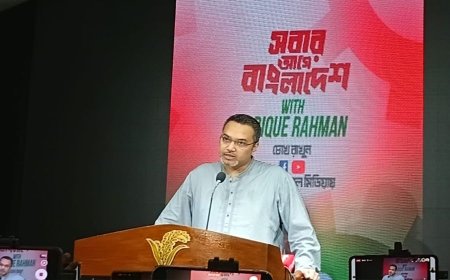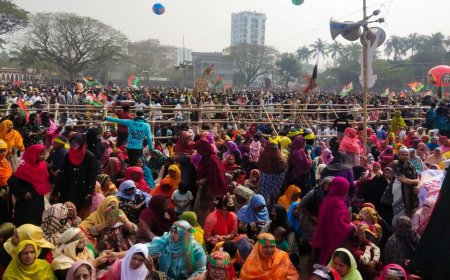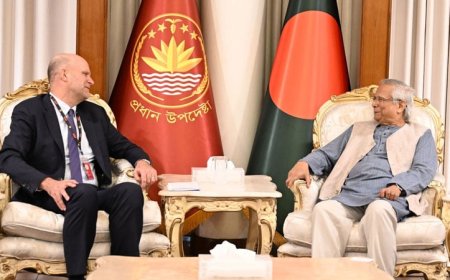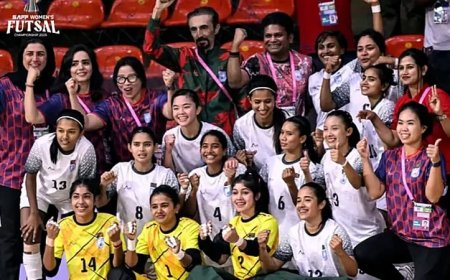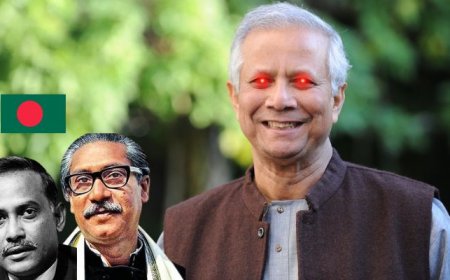"There was once only one enemy, but now foes emerge from every direction." – Nahid Islam
Nahid Islam, an adviser to the interim government, discussed a range of issues with *Prothom Alo*, including students’ efforts to form a new political party, elections, reforms, and the rehabilitation of the families of those martyred and injured in the July mass uprising. The interview was conducted by *Prothom Alo*’s deputy head of reporting, Imam Hossain Sayeed, and staff correspondent, Asif Howladar.
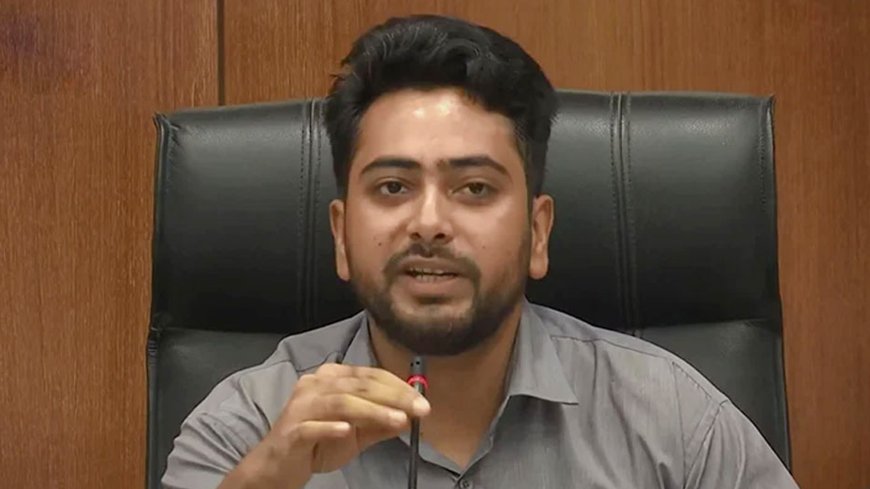
Here’s a rephrased version of the interview while maintaining clarity and flow:
Prothom Alo Interview with Nahid Islam
Prothom Alo: Students who led the July mass uprising are planning to form a new political party. Social media posts from two advisers suggest that you might resign from the advisory council to join them…
Nahid Islam: We have not yet finalized any decision to step down from the advisory council. It may take a little more time. We are evaluating where we can be most effective—within the government or on the streets. The students who participated in the uprising need to be organized and united for both the present and the future.
Since August 5, multiple political parties have been active, but many people with political aspirations remain unaffiliated. They seek leadership roles and want to contribute to nation-building. The idea of forming a political party to bring these groups together has been under discussion since last August-September. Back then, our focus was on stabilizing the government by incorporating existing political parties.
We entered the government as representatives of the mass uprising with specific commitments. Initially, we intended to leave once those commitments were fulfilled, but we are now reconsidering that decision.
Prothom Alo: Will you be taking up any role in the new party?
Nahid Islam: No decision has been made regarding leaving the government yet. If something changes, then…
Prothom Alo: Has a name and launch date for the party been decided?
Nahid Islam: As far as I know, no name has been finalized yet. However, the launch is being considered for the latter half of February, likely between the 15th and 28th.
Prothom Alo: There are reports that one of the three student advisers will join the new party first, while the other two will remain in the government for now.
Nahid Islam: That might be the case.
On BNP and Political Neutrality
Prothom Alo: BNP Secretary General Mirza Fakhrul Islam Alamgir recently commented on the need for a neutral government during elections. You responded on Facebook, suggesting his remarks hinted at another 1/11-like situation. Given that 1/11 was unfavorable for BNP in the past, why do you think he made such a statement?
Nahid Islam: The current government is already neutral in the sense that major decisions are being made through discussions with BNP. For example, students demanded a change in the presidency, which BNP did not support—so the government did not proceed without consensus.
We have also stated that if we engage in political activities, we will do so after leaving the government. So, where does the question of neutrality arise? That’s why concerns emerged over whether BNP is seeking another transitional government, similar to the 1/11 scenario. If that happens, it will be a repeat of the past, when the 1/11 administration paved the way for Awami League’s rise to power. This time, however, BNP might stand to benefit from such a development.
That said, I don’t believe Mirza Fakhrul made the remark with deliberate intent.
Prothom Alo: In a previous interview, you mentioned that BNP’s stance on the interim government resembles that of Awami League. Why do you think so?
Nahid Islam: BNP initially labeled this government as non-elected and insisted that an elected government should take over soon. Awami League also made similar claims, calling the administration unconstitutional and illegitimate. When BNP echoed those remarks, it raised questions about their perspective on the government.
Additionally, BNP distanced itself from the student movement regarding the president and the July Proclamation, further widening the gap. While BNP argues that this is a non-elected government, that argument is misleading. This administration did not come to power through elections but through a mass uprising. Public support is natural in such transitions, even if it is temporary.
If BNP continues to align its rhetoric with Awami League’s narrative, people may struggle to see the differences between them.
On Awami League’s Political Future
Prothom Alo: Adviser Mahfuj Alam recently stated that Awami League will not be allowed to participate in the next election. Is the government planning to ban them?
Nahid Islam: Mahfuj Alam made that statement from a political standpoint. Those of us who represent the mass uprising believe that Awami League has lost its political and moral right to operate under its current name and ideology.
The government has not yet made any legal decision on this matter. However, as trials progress, court recommendations may emerge, and a final decision will be made accordingly. Right now, the priority is ensuring justice. Through the legal process, we will determine the extent of Awami League’s involvement in past atrocities and the roles of its leaders and activists in those crimes.
On Justice and Rehabilitation
Prothom Alo: What is the current status of the July Proclamation?
Nahid Islam: BNP has yet to submit its draft, although they have promised to do so soon. Other parties have already sent theirs, and students submitted theirs a while ago. The government is fully prepared and is simply awaiting BNP’s participation.
Prothom Alo: The families of those martyred and injured in the July uprising have repeatedly taken to the streets demanding justice and support. Many feel the government has not given them enough attention.
Nahid Islam: There have been some bureaucratic delays, but the government is actively working on this. The July Shaheed Smrity Foundation has been providing private assistance, while the government has allocated Tk 3 million per family and will begin distributing Tk 1 million this month. Funds have also been designated for the injured.
Additionally, the Directorate of the July Mass Uprising will soon be established under the Ministry of Liberation War Affairs to ensure lifelong support for the affected families. Many of the injured have received medical treatment abroad, and their education, along with that of the martyrs' families, has been made free. Rehabilitation programs are also being planned.
Prothom Alo: Yet, protests continue…
Nahid Islam: The victims and their families are deeply concerned about the trial process and their security. Since law enforcement has not yet arrested all accused Awami League members, fears persist. Moreover, they are still dealing with trauma, as justice has yet to be served.
Women’s Role in Politics
Prothom Alo: Women played a significant role in the July movement, yet they seem to have disappeared from the political scene. Is the government doing anything to address this?
Nahid Islam: Unfortunately, while society celebrated women’s participation in the movement, it has not embraced their political engagement in the same way. Many women leaders have faced online harassment and bullying.
Political violence remains a reality, and families are still hesitant to let women enter politics. Social barriers also contribute to this issue. However, the spirit of revolution remains strong among them. We are taking steps to encourage their involvement through leadership training and international programs. Professor Muhammad Yunus recently organized an event with female activists from the movement at various universities and districts.
To increase women’s leadership in politics, broader social and cultural changes are necessary.
On Press Freedom
Prothom Alo: Even after August 5, media outlets have faced pressure and threats. As someone in charge of the Information and Broadcasting Ministry, what is your stance on press freedom?
Nahid Islam: To my knowledge, no media outlet has been pressured for criticizing the government. However, we have urged the press to be cautious about reporting on banned student organizations, criminal suspects, and those associated with past fascist regimes.
Some media outlets have faced backlash from the public due to their role over the past 15 years. The government has provided support where needed, ensuring law enforcement intervened against disorderly protests targeting the press.
We want the media to remain independent, offer logical criticism, and publish objective reports. Constructive criticism helps us refine our policies, and we welcome that.
Final Thoughts
Prothom Alo: How would you rate your government’s performance in the past six months?
Nahid Islam: I would rate it slightly below 50%. There are limitations and challenges, but we are committed to change. With more cooperation from political parties, uprising forces, and the public, we can be more effective.
Prothom Alo: Thank you.
Nahid Islam: Thank you.
What's Your Reaction?







